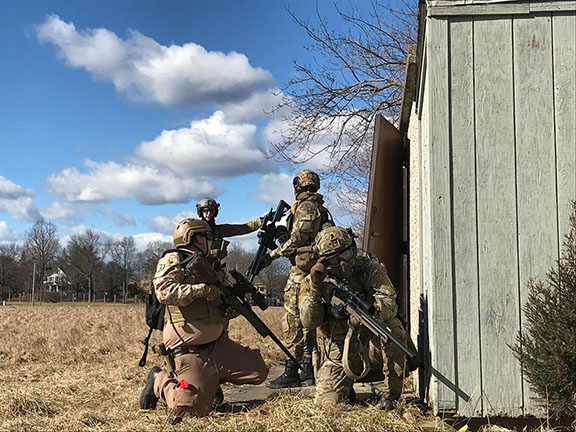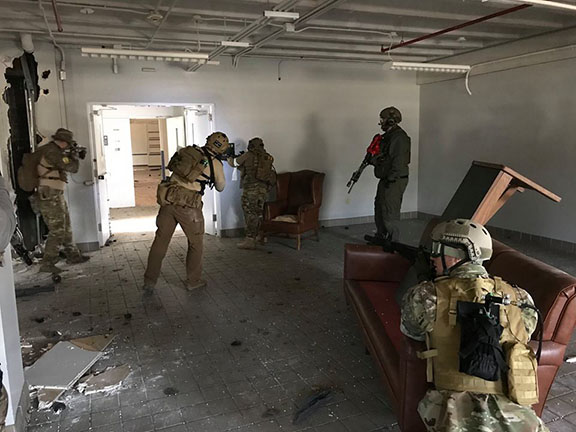By Laura D.C. Kolnoski
FORT MONMOUTH – Since it was decommissioned as an Army base, many see Fort Monmouth in a new light, as an exciting destination for new housing, schools, tech start-ups, breweries and restaurants.
But there are some who love the vacant buildings just the way they are. And they are willing to pay money to use them.
A major television production company has toured fort sites for location shooting and filmed backdrops there. Fort officials have met with the New Jersey Motion Picture and Television Commission to explore other ways the 1,126-acre property might be rented for entertainment projects, said Sarah Giberson, senior marketing and development officer for the Fort Monmouth Economic Revitalization Authority (FMERA).
And Operation Lion Claws Military Simulation Series (OLCMSS) has made three visits to the fort, bringing as many as 300 of its members to participate in a high-tech version of simulated tactical military missions.
The missions utilize “Airsoft” technology, a competitive team shooting sport in which participants use plastic projectiles launched via replica weapons called airsoft guns, explained OLCMSS creator and executive director John Lu of California in a telephone interview.
“We take a video game such as ‘Fortnite’ or ‘Call of Duty’ and turn it into 3-D,” Lu said. “The focus is the backdrop, or the ‘map’ as we say in the video game world. Pseudo-reality makes the game interesting. It’s very realistic.” Paying participants include both civilians and former military personnel.
Lu discovered Fort Monmouth by contacting the state’s Motion Picture and Television Commission in 2014. The approval process took more than two years.

Courtesy Operation Lion Claws / Facebook
“We needed a place to serve our large Northeast client base,” Lu said, adding an “ideal” vacant prison OLCMSS utilized previously in Pennsylvania was demolished. “The buildings at Fort Monmouth are fantastic and we love working with the team at FMERA.”
Giberson said OLCMSS has held events at other Base Realignment and Closure sites across the country.
The group’s first event was conducted in the massive Myer Center, followed by a second in 2018 and another earlier this year. The 36-acre site of the recently demolished Myer Center is on track to be purchased by RWJBarnabas Health for development of a new health care campus.
Lu coordinates with United States Army Recruit and Command, which sets up a recruiting booth at mission sites. Some players have enlisted and gone on to become Green Berets, Navy SEALs, Army Rangers, and military rescue personnel, he said.
Among the leaders of OLCMSS are retired military personnel including Col. Danny McKnight and 1st Sgt. Matt Eversmann, both portrayed in the 2001 film “Black Hawk Down,” Master Sgt. Howard “Mad Max” Mullen, co-author of the U.S. Army’s “Hand-to-Hand Combat Manual,” as well as Green Berets and military veterans of conflicts in Vietnam and Afghanistan.
According to the group’s website, the organization provides venues for men and women to test their “physical and mental strength.” Participants who apply for each event must follow orders and employ teamwork under mock combat conditions.
Operation Lion Claws has received multiple military commendations for support of military veterans and charities, including the Special Operations Warriors Foundation, Iraq Star, Operation Gratitude, and Paws and Stripes. The organization strives to accept returning frontline troops at a moment’s notice, Lu said, adding that OLCMSS has been cited as one of the most effective post-combat stress relief programs by returning soldiers.
“We learned that from vets who come to our events,” said Lu, who established the organization in 2002 because of the help he received from military personnel when he immigrated to Hawaii from Taiwan with his parents as a teen. He chronicled his journey in his book, “Unlikely Yank.”

Courtesy Operation Lion Claws / Facebook
“It’s not the combat they crave, it’s the camaraderie and friendship they miss; the brotherhood and sisterhood,” he said. “We’ve had some PTSD breakthroughs. Our staff intervenes to assist and protect the vets. They usually return for the support system they crave.”
Event hosts pay a fee and a deposit to rent a Fort Monmouth site. They must provide insurance and sign a standard “hold harmless agreement” before they can utilize FMERA property, Giberson said. In addition to conducting a site walk-through before and after the event to ensure the area is secure and free of any event-generated debris prior to returning the security deposit, FMERA approves the use of appropriate sites and notifies local authorities events are taking place. Event hosts are contractually obligated to provide on-site security, waste management and portable bathrooms. Fees are event specific and based on a site-by-site basis.
“With 1,126 acres of land and 5 million square feet of buildings, we have to be creative on how to derive income from vacant property,” said Bruce Steadman FMERA executive director. Profits generated from such events help FMERA fund valuable infrastructure and other fort-wide improvements to help advance its mission of reinvigorating the local economy, Steadman explained.
“Fort Monmouth has offered use of its space for active Army Special Forces, New Jersey State Police, county sheriff, and local police departments for human and canine training, as well as for film production and simulated tactical scenarios by groups such as Operation Lion Claws,” he said.
Lu, whose day job is running an international tourism company, said there are no plans to return to Fort Monmouth at this time, and not solely because the fort’s assets continue to be transformed into future uses.
“We can only use the same location two times per year, six months apart,” he explained. “Consumers don’t always want to return to the same location and prefer places that are exclusive to OLCMSS. The more run-down the better.”














